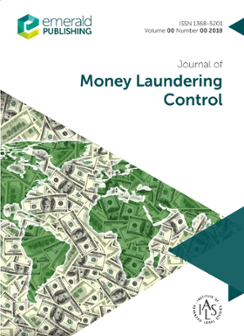Table of contents
Aligning financial inclusion and financial integrity: Regulating and supervising microfinance in Vietnam
Thu Thi Hoai Tran, Louis De KokerThis study aims to consider the anti-money laundering/combating of financing of terrorism (AML/CFT) regime that applies to microfinance institutions (MFIs) and microfinance…
Beyond placement, layering and integration – the perception of trade-based money laundering risk in UK financial services
Mario MenzThe purpose of this study was to investigate the perception of trade-based money laundering in Letters of Credit (“L/C”) transactions among trade finance practitioners in the UK…
An estimation of the underground economy and tax evasion: Empirical analysis from an emerging economy
John Kwaku Amoh, Babonyire AdafulaThis paper aims to use an econometric model to estimate tax evasion from the size of the underground economy and examined the factors that trigger it.
A target-centric intelligence approach to WannaCry 2.0
Adam B. Turner, Stephen McCombie, Allon J. UhlmannThis paper aims to demonstrate the utility of a target-centric approach to intelligence collection and analysis in the prevention and investigation of ransomware attacks that…
The problem of regulating the easy way out – EU money laundering regulation
Kalle Johannes RoseCurrent research within law and economics focus on money laundering as an externality problem caused by financial institutions. Thus, when existing research and legislation place…
The hoax of demonetization in Indian economy: a mathematical analysis
Debasish RoyOver one and half years have passed since the demonetization of Indian economy had occurred on November 8, 2016. The drastic step was initiated by the Prime Minister Narendra Modi…
Money laundering control: the missing link in Trinidad and Tobago
Sherene Alicia Murray-BaileyThis paper aims to examine the socio-economic effect of money laundering in Trinidad and Tobago. It assesses the efficacy of the administration of justice in addressing money…
Anti-money laundering/trade-based money laundering risk assessment strategies – action or re-action focused?
Mohammed Ahmad NaheemThis paper aims to discuss whether most anti-money laundering (AML) risk assessment strategies within the banking and financial services sector are reactionary focused and/or…
Halkbank and OFAC: a sanctions evasion case study
Benjamin Fraser ScottThe purpose of this paper is to use two recent US prosecutions of Turkish nationals for sanctions evasion, the Zarrab and Atilla cases, as case studies of recent developments in…
Digital forensics and evolving cyber law: case of BIMSTEC countries
Sisira Dharmasri Jayasekara, Iroshini AbeysekaraThe purpose of this paper is to discuss the role of digital forensics in an evolving environment of cyber laws giving attention to Bay of Bengal Initiative for Multi-Sectoral…
Data mining for statistical analysis of money laundering transactions
Mark Eshwar LokananThe purpose of this paper is to use statistical techniques to mine and analyze suspicious transactions. With the increase in money laundering activities across various sectors in…
Quo Vadis legal profession participation in anti-money laundering
Lisanawati Go, Njoto BenarkahThis paper aims to explore the obstacles that the ethical guidelines of legal professionals pose in the implementation of an effective anti-money laundering regime, established in…
Crime script for mandate fraud
Michael DoneganThe purpose of this paper is to critically analyse research surrounding mandate fraud and to devise a crime script identifying the crime commission process. It is hoped this will…
Combatting the financing of terrorism in Austria, Germany, Liechtenstein and Switzerland: A hopeless case?
Fabian Maximilian Johannes TeichmannWhilst the existing literature focuses on developing prevention mechanisms for banks, this paper aims to show how feasible it still is in Austria, Germany, Liechtenstein and…
Money laundering control in Tanzania: Did the bank gatekeepers fail to discharge their obligations?
Eugene E. MniwasaThis paper aims to examine how banks in Tanzania have been vulnerable to money laundering activities and how the banking institutions have been implicated in enabling or aiding…
Anti-money laundering ratings: uncovering evidence hidden in plain sight
Ronald F. PolThis paper aims to increase the transparency of information in official anti-money laundering rating data to assist evidence-informed decision-making in compliance, policy-making…
Suing the banks for financing terror: a case study of Linde v. Arab Bank
Joseph Wilfrido RiveraThis paper aims to attempt to tie in specific events into the case of Linde v. Arab Bank to provide a greater context. This case is the first where a US court held a bank civilly…

ISSN:
1368-5201Online date, start – end:
1997Copyright Holder:
Emerald Publishing LimitedOpen Access:
hybridEditors:
- Dr Li Hong Xing
- Prof Barry Rider